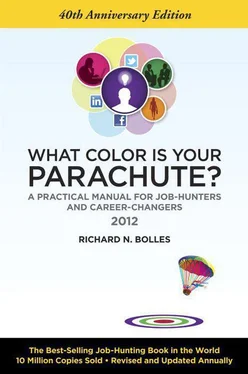I am Hispanic or
I am Black or
I am Asian or
My English is not very good or
I speak heavily accented English or
I am too much of a specialist or
I am too much of a generalist or
I am ex-clergy or
I am ex-military or
I am too assertive or
I am too shy or
I have only worked for volunteer organizations or
I have only worked for small organizations or
I have only worked for a large organization or
I have only worked for the government or
I come from a very different culture or background or
I come from another industry or
I come from another planet.
In other words, our attitude toward ourselves in some cases basically boils down to acting as if there are only three weeks in our life, when we are employable!
Okay, fine! But if you think you have a handicap that will keep employers from hiring you, take heart! No matter what handicap you have, or think you have, it cannot possibly keep you from getting hired. It can only keep you from getting hired at some places .
ATTITUDE: YOU IN RELATION TO THE EMPLOYER
So, let’s look at some good attitudes toward yourself. When you are unemployed, this begins, not surprisingly, with how you think of yourself in relation to employers. The first thing to keep in mind is this:
There is no such thing as “employers.” They are not all the same tribe. Each of them is an individual. But as far as you are concerned, there are basically only two kinds of employers out there: employers who are interested in hiring youfor what you can do; and employers who are not.With the latter you should thank them for their time, and ask if they know of any other employers who might be interested in someone with your skills. Then, gently take your leave. And write and mail them a thank-you note that very night. Then keep going until you find that other kind of employer: the one who only looks at what you can do, not at what you can’t.
The second thing you want to keep in mind, is that “handicap” is a loose term, referring to either job-hunters’ disabilities or employers’ prejudices . There is a difference, and you need to remember that.
Suppose you cannot hear. If you are considering a job that requires acute hearing, then that is a disability: it means there are certain skills you don’t have, that are essential, at least for that job.
But now let us suppose you can hear perfectly, but you are way overweight. If you are applying for that same job, this is not a disability unless it interferes with your ability to do that work. Nonetheless, a particular employer may be prejudiced against overweight people, and simply won’t hire you.
So, here’s the distinction: a disability is something within you . A prejudice is something within the employer .
Both may appear as handicaps that keep you from getting hired, but it is important to understand that a real handicap is a disability you have—you cannot do some important task required in that particular job. On the other hand, a prejudice is a phantom handicap . It may raise its ugly head in one particular interview or more, but if you keep on going, find the right employer, then poof!—the so-called handicap vanishes.
You must just be sure you don’t share some employers’ prejudices. That is, don’t look at yourself through their eyes. Look at yourself through your own eyes.
DETAILED STRATEGIES FOR DEALING WITH YOUR ATTITUDE TOWARD AGING
One handicap, or employer prejudice, that is getting increased attention in the days ahead is age. Millions of baby boomers (the 76 million people born 1946–1964 ) are beginning to enter the so-called “retirement years.” (Ha!) A lot of them are not finding pensions waiting, but are going to have to keep working long after they thought they would have to. What are they running into?
Well, let’s say it’s you who is getting older. It happens. Let’s say you’re in your fifties—or maybe you’re already in your sixties, or seventies, or even eighties. What are employers going to think about you? Well you know what they’re going to think, at least some of them. They will think you’re too old for them to hire. Why? Well, in some cases they just think so. Prejudice!
But in other cases, their concern is their bottom line. Their reasoning is that you will cost too much. Given all your years of experience, you might easily expect a high salary— but they could hire two inexperienced workers in their twenties for what it would cost them to hire just you. You would cost them too much. Also, you would cost them too much if they’re a company that still has a generous pension plan—though that is increasingly a vanishing breed these days. Or you will cost them too much, they think, if age means more medical problems, and they are mandated to have a medical plan.
Still, there are some employers out there who will hire you, regardless of age, if …(and here we have quite a list of ifs —all of which lie within your control, thank heaven, depending on your attitude).
They will hire you:
If they are a small company and they don’t have to put you late into a pension plan; and
If you come with a positive attitude toward your aging. To assist in this, it is helpful to think of your life not in terms of work but in terms of music—particularly a symphony. A symphony, traditionally, has four parts to it—four movements, as they’re called. So does Life. There is the first movement, infancy; then the second movement, the time of learning; the long third movement follows, the time of working; and finally, this fourth movement, traditionally called “retirement,” though now that is an increasingly complex concept. It is much better to think of it as the Fourth Movement, a triumphant, powerful ending to the symphony of our life here on earth.
Onward with our ifs: and
If you convey energy, even in this period of your life. Ask any employer what they are looking for, when they interview a job candidate who is fifty years or older, and they will tell you: energy . Okay, but where shall we find energy, after fifty? When we were younger, energy came from the physical side of our nature. We were “feeling our oats,” as they say. We could go all day, and all night. “My, where do you get all your energy?” our grandmother would ask us. We were a dynamo … of physical energy. But after fifty, physical energy may be harder to come by, despite workouts, exercise, and marathons. Increasingly, our energy must spring not from our muscles but from our excitement about Life; there are inevitably some employers dying to have that excitement in their organization; and
If you have done some life/work planning, and you know alternative ways to describe who you are and what you can do, because you did the self-inventory in chapter 13; and
If you have learned what it is you especially can contribute because of your age. You have learned, above all else, a precious skill: namely, how to handle interruptions. Martin Luther King Jr. said it best, just before his death:
“The major problem of life is learning how to handle the costly interruptions—the door that slams shut, the plan that got sidetracked, the marriage that failed, or that lovely poem that didn’t get written because someone knocked on the door.”
Читать дальше












